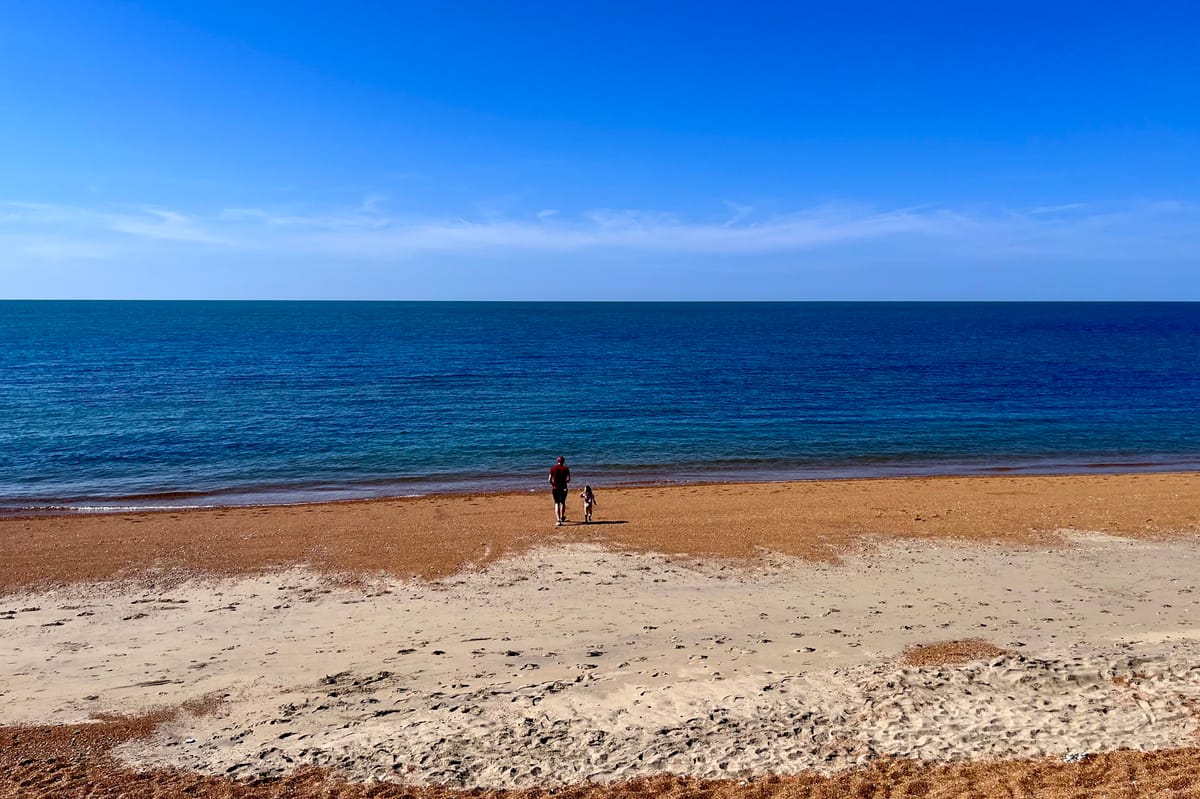My product journey

Hello,
For over a decade, I've worked closely with great founders and their teams around a simple premise: what is this business really about?
During that time, a continuous curiosity has driven me toward all sorts of challenges: from agencies to writing, into startups, running my own business, investing and working with great VCs.
After three years of two new babies and one pandemic, this Summer that curiosity struck again -- and I'm more excited than ever about where it's pointing me, because it feels like an old new beginning.
Entry-preneur
I remember my curiosity and fascination with products starting early.
One of the first examples I remember were credit cards. These fascinating contraband were speckled with arcane sigils -- embossed lettering, holograms, a mysterious long black strip on the back.
When my parents received a new card in the post, I'd be allowed to dismantle the old ones, cutting them up to produce Frankenstein versions. Before long, I decided every child should have access to easy credit too -- so I hand wrote, photocopied and distributed an application form for everyone in my class. I think I must have been about 8. I did not follow GDPR guidelines. It was a more innocent time.
The next year was about conkers. Shiny, almost iridescent -- but made for violence. I started a business where my fellow students could order conkers with special preparations — dehydrated/ vinegar soaked/ tipp-ex covered at different price points.
A couple of years later, I became fascinated with Tamagotchi. So much character squeezed from basic pixels, in the palm of your hand. My parents weren’t rushing to give me more distractions in my life — so I started a babysitting service for my friends called TAMA: The Amazing Maternity Alternative. The best evolution guaranteed, or your money back.
When Apple released the iPod, mine was the first anyone had seen. This pattern continued when I imported the first iPhone early from the US, jailbreaking it for UK use. At the end of my first job interview, the techy MD asked me what phone I had and they hired me on the spot. (Thanks Steve Jobs!)
With the burgeoning App Store, I started to think about what apps I wished existed.
APP 1: Mailbox


The first was an app focused on email triage for Getting Things Done. In principle, your email inbox is just a series of “next steps” to consider. And as a PR agency account exec, managing a dozen clients, team members etc, there were a lot of next steps to consider...
I started prototyping an app where you could swipe left or right to process your inbox on the move, quickly replying, deleting or filing.
It was more a hobby than anything, but I was a mixture of vindicated and gutted when Mailbox appeared not long after, building a waiting list of nearly 400k and setting what has become the standard for processing email to this day.
APP 2: Search/ reviews
Next came an idea for a more focused kind of opinion-led search engine. The web is full of terrible opinions, and ultimately I don’t care about most peoples’ review of something, I care about the experts I trust.
So why not make a little search tool that only delivers results from the sources you choose?

When making purchasing decisions, I found myself often searching for the same kind of formula:
trusted source + product name + review.
e.g.
Eurogamer (game name) review
Empire (movie name) review
Jay Rayner (restaurant name) review
So the app would streamline this on mobile — plus search online and give me a price to decide if I want to order/ book directly (with referral, affiliate fees.)

I did user journey mockups, and worked with a developer friend to create a little web-based prototype. I also outlined a plan for phase 1, phase 2, and where it might evolve in future, including business model.
Loved every minute of it. Used the prototype for a week or two but found I didn’t feel too sad when I went back to just a search engine. Maybe I should have iterated, maybe I should have tested it with more users, I think I would now. Maybe I still will.

Writing
I started blogging and tweeting in 2008, with a simple principle: try to only share ideas I hadn’t seen before. Most of my early posts are about products that interested me, what they might do next. They’re almost all completely wrong. But you’ve got to start somewhere…
By 2011, I was sharing my first ideas with editors — appearing on Wired.co.uk in August with a post about how Amazon could turn Kindle into a ubiquitous read later/ microtransaction platform, and maybe save great writing and journalism in the process.
A year later, this became a full time stint during my gardening leave between jobs, and over time I also became a Daily Telegraph blogger (boy were the comments interesting there) and interviewed a series of founders for Tech.eu. Since, I’ve written for places like The Guardian, TechCrunch, Quartz, Sifted and more.
Throughout my writing and blogging, I think there has been a consistent theme: what is this thing? What might it become? What would it need to do, what would it need to be, what is its essence?
- The iPhone X was not really about a big screen — it was really: what if you could buy next year’s iPhone a year early?
- What if you could make the Kindle platform an internet-wide micro-transaction network for content?
- The iPod effect made content feel worthless by removing hard choices of CD/ minidisc etc.
- Apple should forget smartwatches and build smart health and fitness features into EarPods (before AirPods... this one didn't quite pan out.)
Augur
I've always tried to design Augur with real intent. There are too many agencies (indeed businesses of all kinds) willing to do just about anything for anyone. I was always clear that I'd rather try to do something specific and fail than pursue business by any means necessary.
That meant being really clear about who Augur was made for, and only working with them. Very quickly, I established that as: Series A, "unsexy" B2B tech, doing more than taking journalists for lunch.
Augur used my first hand knowledge of how startups really worked and what they needed to re-engineer and reconsider PR/ Comms strategy for just this kind of business:
- identifying the point of view,
- capturing it in content,
- using that to generate a growing audience,
- and maybe most importantly, implanting systems underneath to make it measurable, scalable, manageable.
We used Asana as the backbone of everything to work smarter. We used Google Analytics + Sheets to spit out automated reporting in a Google Doc. We used OKRs and clearer planning and strategy processes to be a better fit for the innovative companies we worked with.
But maybe my proudest work was in productising what we did to give clients a better way to access services they need to achieve their strategy. And doing so by reimagining the cliche route to solve those problems, without just throwing money at it or hiring people.
Augur Edits
It began with Augur Edits. I love writing, but to do it seriously and as more than just "content", it takes the same kind of energy as much higher value work like strategy + planning.
To be great at something you should do more of less. And at that crossroads between using energy to create content or to plan and manage strategy, the most valuable business for clients focuses on the latter.
When you work with writers, you know how, for ever idea they get commissioned, there's a menu of other ideas that editors don't have budget for. So we invited great freelance journalists from places like the FT and BBC to send us client-relevant synopses that weren't getting picked up, based on a one page brief.
On the client side, they received bios and synopses, and could pick from them like a menu -- knowing that Augur had briefed and vetted what they were seeing as relevant and powerful for the rest of the strategy. Adding value where it matters.
Always the same cost, always the same lead time. We had clients order a dozen of these at a time. We made a product they loved.
Latterly, this has now spun into the media relations too, applying a similar dynamic and creating a shared "currency" of credits that can be used between the two services.
The idea is: a client pays Augur a monthly retainer for the ongoing strategy, planning, review, management and adding value at the high level. And then they can buy bundles of credits to use flexibly on content and media relations as they need it.
Service + product at its best.
What's next?
After so many years helping people think and talk about why their business exists, it's really satisfying returning to the question with hands on the tools instead of perched above it all.
I wrote this draft maybe 3 months ago, and it seems to have lingered without publishing because I've been working on HouseHeld.
The most interesting thing about Product (maybe about life) to me is problems. There are so many "better ways" of doing things in the world, so many ways people should be "eating their vegetables", but they don't. Indeed they will often pursue things that go completely against their own interests.
This is what I'm thinking a lot about at the moment. I'm really excited about where it might lead me. But increasingly I can see how it's a natural chapter in the story so far.

